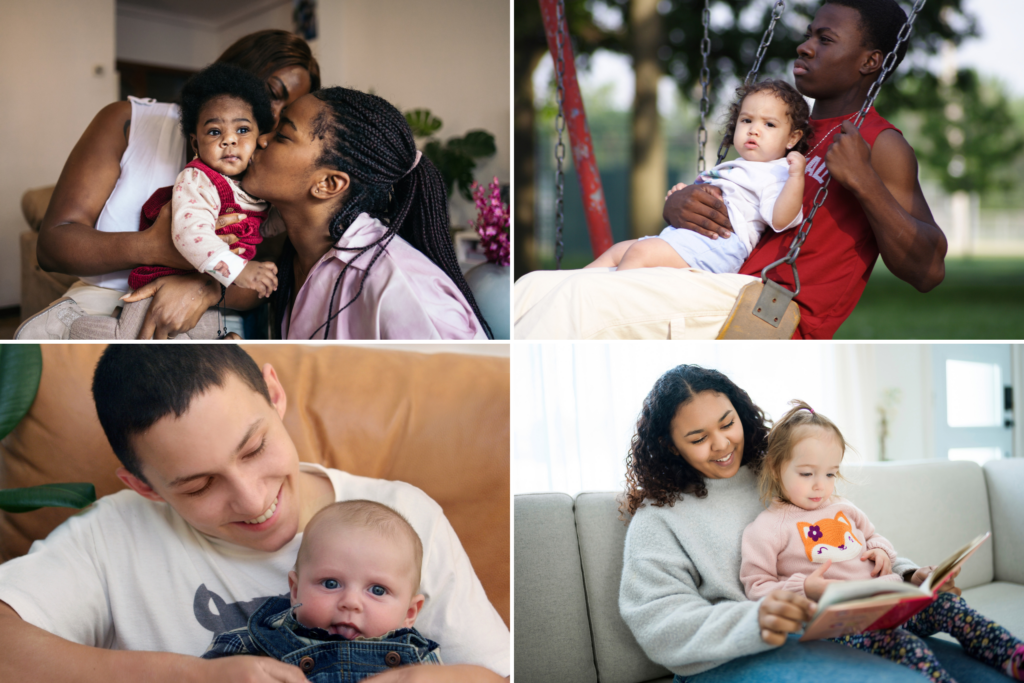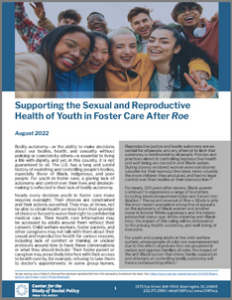
Youth Power, Parent Power mobilizes the collective action of expectant and parenting young people, researchers, system leaders, advocates, community leaders, and youth serving professionals for the promotion of equity and justice. We partner with a group of young parent leaders from communities across the country to plan and lead the initiative’s strategies.
We employ:
- An equity-centered approach. Incorporate CSSP’s Anti-Racist Intersectional Frame in all aspects of our work. Promoting policies and practices that are explicit in achieving equity and justice.
- Sharing power with lived experience experts. Ask, listen, prioritize, and partner with expectant and parenting youth to take action based on their recommendations.
- A multi-generational approach. Policies and practices are responsive to three generations including the adolescent parents, their young children, and the other adults who care for and support them.
- Tools that are developmentally driven. Policies and practices are informed by principles of healthy adolescent brain development, positive youth development, and early childhood development.
- Resources that are trauma-informed and healing centered. Policies and practices recognize the impact of trauma on development and incorporate strategies for screening, addressing trauma symptoms, and supporting and promoting healing.
- A focus on our Protective and Promotive Factors. Policies and practices create opportunities that support well-being, healthy development, and strengthen young families.
- Results-based and learning and accountability driven. Policies and practices incorporate strategies for data collection, analysis, and tracking of results, as well as generating new knowledge for the field.
Examples of Activities
- Bringing together a group of expectant and parenting young leaders from across the country to collaborate, advocate, and transform standards of care and advance equity and justice;
- Helping public systems and community service providers implement best policies, practices, services, and training of staff, that are aligned with what the research indicates expectant and parenting youth, their children, and families need to succeed and thrive;
- Curating, translating, and disseminating knowledge, best practice, resources, and innovative ideas;
- Developing and using training curriculum and materials for system and community leaders, youth serving staff, and expectant and parenting youth; and
- Convening cross-national workgroups for peer-to-peer learning and capacity building
View our network of past and current partners:
Brighter Futures is a multigenerational, cross-sector network led by young parents with lived experience in foster care and allies working towards abolishing oppressive policies and practices such as the surveillance and policing of young parents with lived experience in foster care, and creating communities within New York City where young parents, their children, and families are supported and have what they need to heal, succeed, and thrive.
Our network is led by a diverse group of parent leaders representing various intersecting identities and include lawyers and social workers from legal agencies representing both children and parents; staff from the New York City’s Administration for Children’s Services; community-based organizations, such as CASA-NYC and The Door; and representatives from other New York city agencies including the Department of Youth and Community Development and the Department of Education.
Brighter Futures was formed in 2018. That year, Rise, an organization by and for parents impacted by the child welfare system, published “Where I Come From Doesn’t Determine Where I Will Go: A Guide to Partnering With Parents to Break the Intergenerational Cycle of Foster Care Placement.” The guide offered recommendations by parents with lived experience in foster care and the group was formed in order to turn those recommendations into the changes they want to see in their communities.
If you would like to join the Brighter Futures Workgroup, please contact Fatima Kane: fatoumata.kane@cssp.org.
Brighter Futures Workgroup Member Organizations
Brighter Futures Workgroup Parent Committee Members
- Dominique Arrington
- Jerry Calderon
- Nancy Fortunato
- Isaiah Burrell
- Krystal Morales
- TyAsia Nicholson
- Muhchinu Rahman
- Ashly Hines
- Jonathan DeJesus
- Nathali Feliz
Thank you to all the members of the Brighter Futures Workgroup for your time and contributions.
A project by young parents with lived experience in foster care and the Brighter Futures Workgroup that provides information, resources, and tools for youth and young parents currently or previously in foster care, and the professionals and advocates who support them. This is a great tool for young people in care to know their rights, feel empowered, and advocate for themselves and their families. The website is listed as a resource on the Child Welfare Information Gateway and includes tools developed by young parents, articles, and audio clips where they share their experiences and a range of information from:
- Rights when aging out of care;
- Sexual and reproductive health rights;
- Rights as an expecting and parenting youth;
- Rights during a CPS investigation; and
- Worksheets on accessing concrete supports, identifying a medical provider, co-parenting advice and financial management tips.
Policy Paper
Supporting the Sexual and Reproductive Health of Youth in Foster Care After Roe
August 2022
In response to the overturning of Roe v. Wade, this brief reviews state and federal policy levers that can support the sexual and reproductive health and well-being of youth in foster care and puts forth recommendations for strengthening coverage and access to comprehensive care and ensuring autonomy and consent for care.
(7 pp)
Report
Factors Associated with First and Repeat Births Among Females Emancipating From Foster Care
June 2021
CSSP’s Youth Power, Parent Power initiative partnered with New Jersey’s Montclair State University and the Annie E. Casey Foundation (AECF) on a youth-driven research project to explore the risk and protective factors associated with first and repeat births among females emancipating from foster care. Young parents with lived experience identified the research questions, analyzed the data, co-wrote an article about the research findings, and, using the research findings, co-presented on a national webinar. The article was published by the Journal of Children and Youth Services Review. Please read the article by clicking here.
Webinar
Research Innovations, New Findings, and Practice Implications for Supporting Young Mothers in Foster Care
October 2020
This webinar highlighted a process for partnering with young mothers with lived experience in foster care in conducting research to inform policy and practice for expectant and parenting youth in foster care. Presenters discussed new research findings and research-based strategies for supporting young mothers in care and preventing unplanned subsequent pregnancies.
Report
Expectant and Parenting Youth in Foster Care: Systems Leaders Data Tool Kit
June 2019
The Annie E. Casey Foundation, working with CSSP and other partners, surveyed child welfare jurisdictions to create a snapshot of data each state collects. They designed this tool kit to support child welfare leaders and system leaders in their data collection and continuous improvement efforts.
The document originally appears on The Annie E. Casey Foundation website; for more information, please click here.
(42 pp)
Report
Connecting the Dots: A Resource Guide for Meeting the Needs of Expectant and Parenting Youth, their Children, and their Families
February 2019
This guide provides stakeholders with information on a wide range of interventions that meet the comprehensive needs of EPY, prevent child abuse and neglect of their children, and improve parent and child well-being outcomes.
(103 pp)
Policy Paper
Family First Prevention Services Act: Pregnant & Parenting Youth FAQs
October 2018
The Family First Prevention Services Act (FFPSA) was signed into law on February 9, 2018. The FAQs in this brief provide responses to the most commonly asked questions related to this population.
(2pp)
Video
Understanding the Developmental Needs of Expectant and Parenting Youth
September 2015
This video discusses Dr. Charlyn Harper Browne's paper, which delineates the developmental needs of EPY populations across five domains: sexual and reproductive health, cognitive and emotional development, identity, social development, and preparation.
Video
Effectively Engaging Young Fathers in Child Welfare
February 2017
This video highlights the voices of four fathers involved in the New York City child welfare system. These fathers detail their experience in the child welfare system as fathers and co-parents.
Webinar
Expectant and Parenting Youth: Inaugural Webinar
April 2015
This webinar discusses implications of Reasonable and Prudent Parent Standards under the Preventing Sex Trafficking and Strengthening Families Act (H.R.4980) for expectant and parenting youth and their children in foster care.
Report
Your Rights Related to Sexual and Reproductive Health (SRH): A Guide for Youth in Care
2018
This report is one of three in a compendium of SRH guidance and resources for child welfare jurisdictions. It offers a means of helping youth understand their SRH care rights.
(52 pp)
Report
Sexual and Reproductive Health of Youth in Out-of-Home Care: A Policy and Practice Framework for Child Welfare
March 2018
This report is the cornerstone of a three-part compendium of sexual and reproductive health guidance and resources for child welfare jurisdictions. It is intended for child welfare leadership and policy makers.
(36 pp)
Report
Improving Health Care Services: Opportunities within Medicaid to Support Child Welfare Involved Expectant and Parenting Youth and Their Children
February 2017
This report offers several strategies states should pursue to maximize the health and well-being of adolescent parents who have experienced foster care and their children.
(36 pp)
Report
Expectant and Parenting Youth Developmental Needs: Paper
August 2015
This report outlines how to best serve expectant and parenting youth in foster care—listing five domains crucial to developmental needs that create positive experiences and mitigate or prevent adverse outcomes.
(46 pp)
Report
Changing Systems and Practice for Young Fathers to Improve Outcomes for Young Fathers, Their Children, and Their Families
February 2017
This report makes recommendations for child welfare system policy and practice changes that recognize the critical role young fathers can play in improving the outcomes of their children and families.
(24 pp)
Report
Supporting the Sexual and Reproductive Health of Youth in Out-of-Home Care: A Guide for Caseworkers
2018
This report provides information and resources designed to help caseworkers effectively support youth around issues of sexual and reproductive health—from rights and privacy to case planning and decision-making.
(29 pp)




